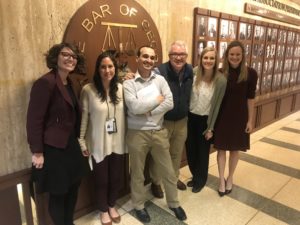 Last week, I had a post-conviction motion in a county where I never practice. The motion is under advisement, so I won’t go into the particulars about it or what happened at the argument. I write today about the things I did before the hearing started and I plan to do those things even when I find myself in court in more familiar places.
Last week, I had a post-conviction motion in a county where I never practice. The motion is under advisement, so I won’t go into the particulars about it or what happened at the argument. I write today about the things I did before the hearing started and I plan to do those things even when I find myself in court in more familiar places.
The first thing is that there is a sign in the hallway, just as you enter, warning you to turn your cell phone off. The sign said nothing of putting it on silent or on vibrate. Off means off. So, off it went. Next, I pulled out my laptop just long enough to get the files I needed for the hearing onto the desktop. Then, I did the worst thing I can ever do when I’m in a courtroom waiting for my case to get called and bored. I checked my email. I am reminded what productivity guru David Allen said about email: “Any email could be either a snake in the grass or a berry.” Many of my phone messages go to email. So, for me, checking email means also checking voicemail. And that day’s inbox was filled with snakes. But even berries were not what I needed to see at that moment.
I was dumb, but not that dumb. I saw from the snippets in the in-box that I had read too far. But I stopped before I opened any of them. In fact, it was time to close the laptop and step slowly away. I also knew I couldn’t trust myself so I turned off the wifi receiver on the laptop. With the phone off and its array of distractions away, I had three solid hours to sit there in this South Georgia Courtroom while the court handled other business. What, then, to do with my time?
I took a small notebook and a pen, and I moved from the jury box where I normally sit over to the pews, dead center of the courtroom where I could watch the lawyers, the judge, the witnesses, the court reporter, the bailiffs, and the clerk. I took notes on the things I saw. It was among the best two and a half hours I ever spent in a courtroom. I watched a pre-trial conference where two sets of pissed-off South Georgia family members would soon be pitted against one another in a jury trial without a lawyer to contest a will. I watched two motions to suppress, and I watched the calling of the calendar in its entirety.
With notebook in hand, I watched every objection, heard every argument, sized up how the judge talks to people in conferences, noted how witnesses are sworn (every courtroom is a little different. Sometimes the judge swears them in. Sometimes it’s the clerk. Sometimes it’s the lawyer. The oath is sometimes a little different, too). I noticed the atmosphere of the courtroom (the judge likes it to be quiet and orderly. There isn’t room for a lot of drama. The judge, not the lawyers, runs the courtroom. He quietly contemplates objections before ruling on them). I noticed where sequestered witnesses go before being called in (turns out, it’s in a room behind the bench and not out in the hall). I noticed a number of things I would not have seen had I been responding to email, fiddling with my phone, or going out into the hall to take calls.
There was a fifteen minute break between the first few cases and the next few before mine was ultimately called. I used that fifteen minutes to huddle with my client in the holding cell and my client’s family. We made a few changes to the game plan in light of what we observed.
I also saw how the prosecutor responded to certain situations. And I likely saw several things that changed my approach beneath the level of consciousness. For a couple of hours, I took it all in.
Had I been someplace else, I might have read some advance sheets, edited a brief, or responded to some “pressing matters” on the phone or laptop while I waited. Had I been in a more familiar place, I might have “visited” with other lawyers. And, had I not moved, I would have “watched” the whole thing from the sidelines instead of moving to a place where I could see all the body language and facial expressions.
I am going to integrate the lessons in to future court appearance even in closer lands. After all, just as you “can’t step into the same river twice,” you never step into the same courtroom twice. A courtroom is a dynamic thing that changes with the mood of the participants, the types of cases on the calendar, the weather outside, the witnesses who appear, and what the drive to the courthouse was like. I hope to really be in the next courtroom I enter. In fact, the next time I go to a distant one, I think I’ll come down a few days before just in case I don’t get the gift next time of being last on the calendar.




